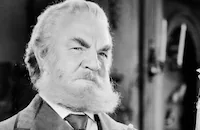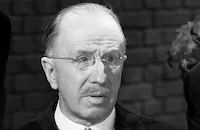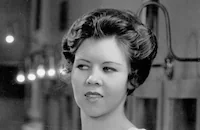Babbitt

Brief Synopsis
Cast & Crew
William Keighley
Aline Macmahon
Guy Kibbee
Claire Dodd
Maxine Doyle
Glen Boles
Film Details
Technical Specs

Synopsis
Realtor George F. Babbitt lives with his wife Myra and his two children, Verona and Ted, in the fast growing Midwestern town of Zenith. Popular and successful, Babbitt has just been elected the new Grand Ringmaster of his lodge, the Zebras. All is not as pleasant as it appears on the surface, however. Babbitt is troubled by his unhappy friend, Paul Reisling, whose nagging wife Zilla makes his life miserable. He is also involved in a land deal that Myra and Ted have warned him doesn't seem honest. When Paul, finally driven too far by Zilla's nagging, shoots her, Babbitt is the only one to stand by him. Myra takes Zilla's side, and when Zilla leaves the hospital to convalesce, Myra goes with her. Left on his own, Babbitt starts spending time with Tanis Judique, a young widow who rented an apartment from his company. Tanis wheedles the details of Babbitt's crooked land deal from him and uses the information to try to blackmail Commissioner Gurnee and banker Luke Ethorne. When she is unsuccessful, she then asks Babbitt to pay her to keep quiet. All of Babbitt's money is in his wife's name, however, and when he doesn't pay, Tanis tells her story to the newspapers. Scandalized, the Zebras ask Babbitt to resign. Finally, he confesses his problems to Myra, without mentioning Tanis' name, and she figures out a way to make him look like a hero instead of a villain. His troubles over, Babbitt allows Ted to study electrical engineering rather than business, and the Zebras ask Babbitt to come back as their Grand Ringmaster.

Director

William Keighley
Cast

Aline Macmahon

Guy Kibbee

Claire Dodd
Maxine Doyle
Glen Boles

Minor Watson

Minna Gombell

Alan Hale

Berton Churchill

Russell Hicks
Nan Gray

Walter Walker
Arthur Aylesworth

Addison Richards
Harry Tyler

Arthur Hoyt

Mary Treen
Mitchell Ingraham

Hattie Mcdaniel
George Offerman Jr.
John Hyams

Irving Bacon
Walter Regan
Frances Lee
Sam Mcdaniel
Eddie Shubert
James Donlan
Henry Otho
Pauline True
Jack Mchugh
Edward Piel Sr.
Milton Kibbee
Jackie Saunders
Gertrude Valerie
Crew

Videos
Movie Clip


Trailer
Film Details
Technical Specs

Articles
Babbitt
The first image after Babbitt's credits is a Rotary International sign standing proudly against the sky, and it's an ideal way to introduce the story of a man who treasures his business interests and old-boy friendships as wholeheartedly as other people value their religions or political affiliations. George F. Babbitt is his name, real estate is his game, and the (fictional) city of Zenith, located somewhere in the American grain belt, is his town. Judging from appearances, Babbitt is around fifty years old he's forty-six in the novel and he lives in a comfy house with his wife Myra and their three children, ranging from preteen to young adult.
Apart from hustling real estate at his office, Babbitt's biggest activity is what 1920s lingo called boosterism, now known as public relations or promotion. Although he isn't as young as he used to be, Babbitt is tireless when it comes to boosting his business, boosting himself, and above all boosting Zenith, the city that makes all his accomplishments possible. Occasionally he feels a vague uneasiness about his life; as he realizes at one point in the novel, his contribution to the community boils down to selling "badly built houses" for more than people can really afford to pay. This feeling always passes, but it always comes back again too. Babbitt the booster may be heading for a midlife crisis, although neither the term nor the concept has been invented yet.
It's unlikely that any Hollywood studio would have produced a picture that followed the structure of Lewis's novel, which spends several chapters following Babbitt through an average day, then accompanies him on a series of visits and trips, and finally shows him accepting his humdrum life after briefly rebelling against it by consorting with nonconformists and dabbling in liberal politics. To keep the movie moving, the screenwriters exploit a couple of the book's more dramatic incidents. One involves Babbitt's best friend, a sensitive fellow named Paul Reisling, who hates his business, plays the violin in his spare time, and is harassed day and night by Zilla, his ill-tempered wife. Henpecked into a stupor, Paul eventually pulls out a gun and shoots Zilla, landing in the penitentiary despite Babbitt's good-faith efforts to help him.
The film presents this much as the book does, but it takes far greater liberties with an extramarital fling that Babbitt indulges in, much to his own surprise. The object of his affection is Tanis Judique, an offbeat beauty who meets him during a real-estate transaction. In the novel, Babbitt starts hanging around with Tanis's young and racy friends, wearying his aging bones so much that he's relieved when the relationship inevitably ends. Combining this anticlimactic fling with another of the novel's subplots, involving a shady business deal that Babbitt stumbles into, the movie invents a melodramatic plot twist wherein Tanis blackmails her bumbling boyfriend, threatening to ruin his reputation and career until Mrs. Babbitt saves the day so ingeniously that Tanis is defeated and Babbitt becomes Zenith's hero of the day. This is the least convincing part of the film, but it's fun in a hokey way.
Keighley came to Hollywood from the Broadway stage. He was only a couple of years into his movie-directing career when he made Babbitt, and he hadn't yet done the hardboiled crime pictures "G" Men (1935), Each Dawn I Die (1939) for which he's best remembered. He gives Babbitt a straight-ahead studio style with no idiosyncratic touches, concentrating his energies on clear, no-nonsense storytelling with performances just quirky enough to keep the stereotypical characters interesting. MacMahon gets top billing as Myra Babbitt, reflecting her relative clout with First National and Warner Bros. at the time, and her down-to-earth acting is the film's most reliable center of gravity; during the far-fetched climax you can almost believe she's clever enough to single-handedly turn the tables on everyone in sight. Kibbee plays the title character with more sobriety than he brought to, for instance, his famous portrayal of infatuated Abner Dillon in 42nd Street the previous year. Claire Dodd is perfectly cast as slightly exotic Tanis, and equally solid contributions come from Minor Watson as moody Paul and Minna Gombell as shrewish Zilla, bearing out the genius of the central-casting system in its prime.
Given the impersonality of Keighley's style and the many changes made to Lewis's storyline, the movie's main source of ideas appears to have been the writing team, consisting of Mary C. McCall, Jr., who has primary credit, plus Tom Reed and Niven Busch, who did the adaptation, and Ben Markson, who penned additional dialogue. Looking back on the group approach that dominated scriptwriting during the studio era, Busch said years later that "the collaboration system was something you wanted to get away from, but you had to put up with it. I had at least one collaborator, named Tom Reed, with whom I wrote what was supposed to be the screenplay for Babbitt; he was a delightful guy [with] a fiendish sense of humor." While the humor in Babbitt is anything but fiendish, the film's perky performances and generally good nature (aside from its mean-spirited portrait of Zilla, transplanted directly from the novel) make it reasonably engaging today. For those who want their Sinclair Lewis in somewhat purer form, Richard Brooks's superb 1960 adaptation of Elmer Gantry, with Burt Lancaster and Jean Simmons, is definitely the gold standard.
Director: William Keighley
Screenplay: Mary C. McCall, Jr.; adaptation by Tom Reed & Niven Busch; additional dialogue by Ben Markson; based on novel by Sinclair Lewis
Cinematographer: Arthur L. Todd
Film Editing: Jack Killifer
Art Direction: John Hughes
Cast: Aline MacMahon (Myra Babbitt), Guy Kibbee (George F. Babbitt), Claire Dodd (Tanis Judique), Maxine Doyle (Verona), Glen Boles (Ted), Minor Watson (Paul), Minna Gombell (Zilla), Alan Hale (Charlie), Berton Churchill (Judge Thompson), Russell Hicks (Commissioner Lyle Gurnee), Nan Gray (Eunice Littlefield), Walter Walker (Luke Ethorne), Arthur Aylesworth (Zeke), Addison Richards (district attorney), Harry Tyler (Martin Gunch), Arthur Hoyt (Willis Ivans), Mary Treen (Miss McGoun).
BW-74m. Closed Captioning.
by David Sterritt

Babbitt
Quotes
Trivia
Notes
The movie is the second to be based on Sinclair Lewis' novel Babbitt. The first, produced by Warner Bros. in 1924, was directed by Harry Beaumont and starred Willard Louis and Mary Alden as the Babbitts (see AFI Catalog of Feature Films, 1921-30; F2.0212).















